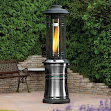Why air conditioning units can make your premises smell, from London Cool
Possibly
we should get out more, but it is true that air conditioning systems can give
off smells, evidenced by recent reports which have highlighted an increase in
the number of room air conditioning units giving out a bad smell.
Research has shown that one reason for the bad smells in installed air conditioner
systems is a rather disgusting one – dead skin!
Scientists
have discovered that the stench from smelly air conditioner systems is caused
by dead skins cells that our bodies shed which are then trapped in room cooling
units, air conditioner filters and coils. Bacteria that live in air
conditioning units survive by eating dead skin cells. With each person
shedding approximately 8lbs of dead skin cells each year, these are rather well
fed bacteria.
From
our offices we serve London and the South East.
We have looked at our air conditioning call outs, especially for
companies that have no air conditioning maintenance contracts or service
contract visits for installed air conditioning. A lot of the call outs
for breakdowns or air conditioner smells are due to poor maintenance or
understanding how room air conditioners work. Dead skin will get into air
conditioner systems and if this skin or hair also has perfume, aftershaves,
hair or skin conditioners then this will add to the amount caught in room air
conditioners’ filters and coils and increase the potential for installed air
conditioning systems to give off odours.
Now
here comes the science bit . . . dead cells contain keratin, a structural protein which
makes up fingernails and hair in humans. In room air conditioning units,
the bacteria that live there contain chemicals called keratinases. When
the keratinase chemicals digest the skin cells, the keratin is broken down and
produces ammonium which is circulated by the air conditioning unit - spreading
the smell of urine.
Proteins
make up a large portion of the human diet and are converted to ammonium after
they are broken down in the liver. As it passes through the liver,
ammonia is converted to ammonium and then to urea - the main ingredient in
urine – with its very distinctive smell.
You
don’t need to be a scientist to realise that any air conditioning units which
are home to the bacteria are likely to make your whole house, car or office
smell like urine. With a lot of air conditioner smell call-outs, people
will say their air conditioning smells of cat urine – which seems pretty unfair
to cats! Other chemicals found in human
skin cells - eg lipids and triglycerides - can create other revolting smells.
Dr Lai
Ka-man, an associate professor at Hong Kong Baptist University led the study[1]
which discovered that 'skin squames' (
or dead skin cells) are a source of food
for the bacteria that live in AC units.
Dr Lai
said 'For effective long-term odour control, it is important to reduce the
amount of skin squames from entering the air-cooling units. The simplest way is to install an
appropriate filter to capture the skin squames in the air. A filter that can effectively capture
particles less than 0.001 centimetres should help improve the odour problem.'
Specialist
air conditioning filters are available for air conditioning beauty salons,
cooling for hairdressers, and air conditioning with energy efficient heat pump
filters are available for offices and even for domestic air conditioning
systems.
We
also recommend regular servicing of your air conditioning installation as this
help to reduce the amount of skin squames in the unit. In addition, regular
maintenance will prolong the efficiency and maximise the performance of your
system while helping to avoid costly breakdowns which can occur through
lack of planned preventative maintenance (PPM).
London
Cool are able to supply installed air conditioning service and maintenance
contracts for all major air conditioner manufactures such as Daikin, Fujitsu,
Toshiba, Mitsubishi.

Comments
Post a Comment
We would love to hear your comments or views on portable air conditioners or fixed air conditioning systems or anything else in our Cool Blog